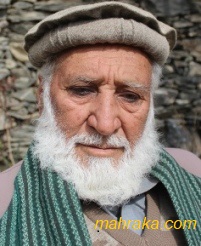
Gul Nawaz Khaki is recognized as the kingpin, for his prolific work towards preservation and promotion of the indigenous Khow culture of district Chitral, northern Pakistan.
He was born on Friday, 1st February 1937 in Shamirandeh, Singor, Tehsil and District Chitral. His father’s name was Sher Nawaz Khan. He was educated at the historic High School Chitral. In 1957,he started his career as a medical technician. He shifted many jobs, and among these was as an editor in the Monthly Jamhoor e Islam Peshawar, a Khowar Journal published by the Border Publicity Organisation of the Government of Pakistan. The job much suited to him, for its literary and journalistic nature. During his stay in Peshawar, he also worked in the Radio Pakistan’s Khowar Program as one of its pioneers. This was his last job, and after quitting this he devoted himself for literary and cultural activities.
Commenting on Gul Nawaz Khaki’s progressive contribution, Maula Nigah Nigah, a distinguished poet, writer and educationist said: “whatever job he did and wherever he served in his prolong professional career, Khaki proved as a devout custodian of Khow culture: upheld its values; and bolstered its publicity”. He has down-to-earth knowledge, vibrant taste and love for the said culture.
Nevertheless, Khaki’s invaluable outputs lie in Khowar literature, art and music in his capacity as a poet, playwright, prose writer, tune composer, sitar player and public speaker. He has written eight books of both poetry and prose encompassing diverse themes and issues pertaining to Khowar speaking communities of northern Pakistan. Detail description of Gul Nawaz Khaki’s literary works is reckoned as follows:
- “Eid-e-Milad-un-Nabi’ (the celebration of the holy prophet’s birthday) published in 1974. The book contains ‘naat’, ‘manqabat’ and prose dedicated to the prophet (PBHU)
- ‘Khush Watan’ (Sweet Country) published in 1972. The book contains prose/ songs of patriotism and national integrity by the writer and other high profile poets of Khowar language. It was published by Tribal Publicity Organization (TPO), Peshawar
- ‘Mir-e-Karawan’ (biography of Quaid-e-Azam Muhammad Ali Jinah) published in 1976. The book was written on the demand of the then government about the life of the founder of Pakistan.
- ‘Nogh Shakhor’ (New Ray) was published in 1973. The book is a detail description of ZA Bhutto’s visit to Chitral. It, too, was published by TPO, Government Pakistan.
- THORON (Khowar name for a pungent-scented wild flower of Chitral), is a collection of old romantic Khowar songs by renowned poets and tune composers published in 2010 by Anjuman-e-Taraqi Khowar—an organization working for promotion of Khowar literature and language.
- SORNIK (Khowar name of a flower that grows along channels and terraces) still another priceless collection of old Khowar and Persian songs. The book was published in 2010 by Anjuman-e-Taraqi-Khowar.
- ‘Laghal-e-Jafariad’ (Ruby)—a commendable book containing the precious work of old Khowar poets published by Khaki himself.
- ‘Barish’ (a sweet-scented white-colored flower that grows in the shade of rock) is in the process of being composed at the movement and will be marketed shortly.
- ‘Tombloki’ (blossom) is a complete collection of Khaki’s poetry yet to be published.
- His work on Khowar-Urdu-Dictionary is in progress and till date more than 35000 vocabularies have been collected, sifted, categorized and translated into Urdu language.
- He also worked as editor of Jamhoor-e-Islam Khowar’ for six years. During his editorship the journal flourished and its readership expanded greatly.
- He also served as president of Anjuman-e-Taraqi-Khowar Chitral for two terms. For the first time from 1993 to 1994 and for the second time from 2003 to 2006.
As Radio and TV artists, Gul Nawaz Khaki has played critical role in highlighting the folklores, folk history and social/developmental issues of the Khowar speaking communities of district Chitral, northern Pakistan. He has not only written a great deal of scripts and features for radio Pakistan’s Khowar dramas but also impressively played the character of an ‘ideal teacher’, ‘skilled farmer’ and ‘caring father’, which was appreciated.
Khaki planned and directed for six years the once famous Ppurdom Programme’ of radio Pakistan Peshawar. For the programme, he also worked as a facilitator and teacher and kids used to call him ‘miki’ (honorable uncle). “Many of the Programme Children became prominent in professional life like Dr. Noor-ul-Islam of District Headquarter Hospital Chitral”, Khaki explained.
Through this platform, he innovatively assimilated modern technology with the Traditional Indigenous Knowledge (TIK) of the Khowar speaking communities having great inspiration for youngsters across the Chitral district.
Gul Nawaz Khaki represented Chitral in Pakistan Television programme on August 14, 1973 featuring three of his own folksongs. He was also the key character to play in the famous Khowar fiction ‘nane nane afhera ka goyan, nane zhane ano pazhal nowa’ dramatized in 1976. It was a thirty minute documentary that was scripted by Professor Israruddin and involved twelve characters.
Narrating his competence as composer Khaki said: “though I have composed tunes for a great deal of songs of my friends aside from those of my own, yet I honestly feel that I am not a very good one when it comes to compare myself with the legendary figures of the art such as the late Amir Gul Amir and Ghulam Nabi (phok brar)”. “However as composer”, maintained Khaki, “I have taken great pain to keep Khowar tunes from adulteration by carefully crafting Persian tunes into Khowar and on occasions harnessed classical Urdu tunes for the purpose”, he disclosed.
Folk music and folk art is what Gul Nawaz Khaki is widely known for within Chitral and outside it. A great deal of his songs recorded for Radio Pakistan Peshawar has sizable audience even today. “As a young man I have had opportunities to attend a range of music events along with the juggernaut of folk music i.e. Ziarat Khan Zerak, Songhor; Muhammad Nadir Khan, Kosht; Gul Tata, Booni; Rehmatuddin, Shoghor; Afzal lal, Shoghor; Amir Gul Amir and Ghulam Nabi (Phok Brar), Chitral town”, he reminisced. Perhaps this has underpinned Khaki’s devotion and commitment to Khowar art and literature.
Obviously modern technology has had profoundly altered the trend and paraphernalia of Khowar folk music and art. “The folk artists of the olden times, said Khaki, “were mostly amateur and had least thought for commercialization of music because for them it used to be the medium of self-expression, identity and consolation”. He said as a young man he grew surrounded by leading artists and lovers of literature. “The rulers of Chitral’s erstwhile state generously patronized the folk music, folk history and folklores of the region and people related to art and music earned respect and reputation then”, he acknowledged.
But now circumstances have changed altogether. Folk musicians and artists at present show much interest in material benefits and it seems quite difficult to bring Khowar music at a par with music of other cultures without adding economic incentives to it. The intrusion of technology has modified audiences’ taste and perception. No one properly understand where and how to start the process of modernizing Kho music. Lack of skills for quality management is a pressing problem. No serious efforts have so far been undertaken for its marketing. Certainly it also needs better sound quality and improved body language on the part of artists. On the other hand, however, the introduction of radio, tape recorder, computer, television and mobile has already eroded the credibility of live performances. Thus Khowar folk music seems to be at a crossroads now and nothing is likely to reverse the prospect short of a well-thought-out technical intervention.
Gul Nawaz Khaki still play sitar and occasionally utter a note or two along with sitar music. He said the growing age has almost smothered the tuneful flow of his voice turning it hoarse. “As I have grown old, my throat does not elicit standard intonation for folksongs, ehe dunia!” he said in a melancholic tone.
When asked about his favorite artist, Khaki said: “Once Ghulam Nabi (phok brar) said: “‘Mansoor Shabab can be a great folk singer should he continue with appropriate guidance from some expert tutors’”. “So I, too, consider Mansoor as a great artists of present time Chitral”, Khaki confirmed.
Last but not the least; Gul Nawaz Khaki happened to be a gifted public speaker. His speeches are always filled with rural jargons and classical ideas reinforced by honest feelings and emotional eruption that has stimulating impact on the audiences. Most of his uniquely-toned speeches are extempore with peculiar rhythm gradually climax. It is so characteristic of him.
May Khaki live long and continue his precious work for Khowar music, art and literature!
 Back To Main Page
Back To Main Page
